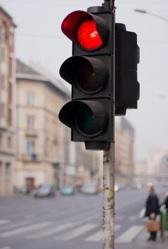Defense & Driver's License
Reinstatement Attorneys

Illinois law (625 ILCS 5/11-305 and 5/11-306) requires drivers facing a steady red signal to stop at a clearly marked stop line or, if no line exists, before entering the crosswalk. If a clearly marked line or crosswalk does not exist, the driver must stop before entering the intersection. The vehicle must remain stopped until an indication to proceed is displayed.
Unless it is otherwise prohibited by a posted sign, motorists are permitted to make a right turn at a red light. The driver must yield to any oncoming vehicles as well as pedestrians within the crosswalk or intersection. If a right turn on red is prohibited, the vehicle must remain stopped until an indication to proceed is displayed.
A steady yellow light warns that a red light will be displayed immediately thereafter, but it is not illegal for a driver to enter the intersection while a yellow light is displayed. If a driver enters the intersection after a yellow light is displayed and the light turns red while driving through the intersection, he/she could still be charged with running a red light.
Illinois law 625 ILCS 5/11-1204(b), requires drivers to obey all stop signs. Drivers must stop at any intersection with a stop sign before entering the crosswalk or, if there is no crosswalk, at a clearly marked stop line. If neither a crosswalk nor clearly marked stop line exists, the driver must stop at the point nearest the intersection roadway where the driver is able to view approaching traffic. These rules must be followed unless the driver is directed to proceed by a police officer or a traffic control signal.
Illinois law 625 ILCS 5/11-1204(c), requires drivers to obey all yield signs. Drivers must stop at a yield sign before entering the crosswalk or intersection if required to do so for safety. If there is no crosswalk, the driver must stop at a clearly marked stop line. If there is no crosswalk or clearly marked stop line, the driver must stop at the point nearest the intersecting roadway allowing the driver to view any approaching traffic on the intersecting roadway.
Also, under 625 ILCS 5/11-305, drivers must obey all officially erected traffic control devices such as traffic signals and ‘no turn’ signs. Also, under this particular statute, it is illegal to leave a roadway and travel across private property for the purpose of avoiding a traffic control device. An example of avoiding a traffic control device is when a driver is approaching a red light and decides to cut through the parking lot of a gas station at the corner to circumvent the light.
Under Illinois law, the above mentioned traffic tickets are are petty offenses, which are punishable by a maximum fine of $1,000.00 in addition to any mandatory court costs and assessments. Disobeying a stop sign, yield sign, traffic control device (e.g. red light) are all treated as moving violations under Illinois law. Paying your ticket will result in a conviction, which will be entered on your driving record by the Illinois Secretary of State. Convictions count against a suspension of your driver’s license. Convictions will likely cause increased insurance rates as well. If an accident results from running a traffic light or stop sign, or if an officer determines that a motorist was driving recklessly, additional charges may be filed. Furthermore, if a motorist is fleeing or eluding an officer and runs a red light or stop sign, more serious penalties may be imposed.
An experienced traffic attorney may be able to assist in keeping these offenses off of your public record. A sentence of court supervision may be negotiated or a traffic attorney may be able to secure a finding of not guilty at trial. This will prevent the offense from counting against your driving privileges or affecting your insurance rates or employment.
The traffic attorneys at The Davis Law Group, P.C. handle traffic tickets throughout the Chicago area including Cook County, Lake County and DuPage County. Feel free to explore our website and contact us today to discuss your case.